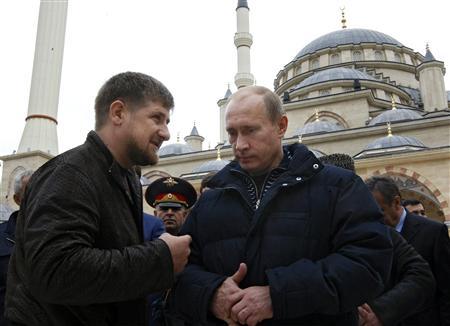
Kadyrov’s Fascism Especially Dangerous Because It Is Rooted in Religion, Zakayev Says
Publication: Eurasia Daily Monitor Volume: 19 Issue: 41
By:

The fascism Ramzan Kadyrov has established in Chechnya has much in common with the fascism promoted by Vladimir Putin, says Akhmed Zakayev, head of the government in exile of the Chechen Republic of Ichkeria. But there is one critical difference that the international community must face head-on because it will make rooting out Kadyrov’s variety even more difficult than doing the same with Putin’s. Zakayev says that difference involves religion. Unlike Putin’s, Kadyrov’s fascism rests firmly on religious sectarianism, has deeper roots and may pose a direct threat to the Putin variety (The Chechen Press, March 17).
Like many analysts in Russia and the West, Zakayev bases his argument that Putinism and Kadyrovism are fascist on Italian writer Umberto Eco’s now classic list of the 14 characteristics of fascism. (For Eco’s 1995 original and much-republished text in The New York Review of Books, see Eternal Fascism; for other Russian commentators who have drawn on that list to make the case that Putinism is a form of fascism, see Kasparov.ru, June 9, 2020; Radio Liberty, February 21, 2022; Umbra.blog, August 2, 2016).
According to Eco, regimes are fascist, whether they call themselves that or not, if they share the following characteristics: a rejection of liberalism, a deep suspiciousness toward the intellectual world, an unwillingness to tolerate criticism, a call for struggle against those classified as alien, a reliance on populations that have suffered from economic and political crises, an attachment to conspiracy theories and the notion that their country is a besieged fortress surrounded by enemies, a belief that their enemies are unjustly well off but ultimately weak and therefore destined to lose, the idea that life is an eternal struggle, a commitment to elite dominance concealed behind populist slogans, a cult of heroism and even death, a cult of “manliness” which often grows over into homophobia, a rejection of what they see as “the rot of parliamentary democracy,” and the debasement of language through an Orwellian newspeak that calls their enemies fascist but often refuses to acknowledge that they are that themselves.
As Zakayev clearly shows, the regimes of Vladimir Putin and Ramzan Kadyrov share all 14 of these characteristics and thus are properly classed together as fascist. But there is an essential difference between them, he argues, which is often missed but has extraordinarily important consequences and means that Kadyrovism is “an unusual form of fascism.” Putinism doesn’t rest on religion, while Kadyrovism ultimately does, a feature of the latter which gives it greater mobilizing and staying power because it echoes the role of religious movements in the political and military ones of the North Caucasus in the past.
To legitimate himself, Ramzan Kadyrov has long tried to make of his late father, Akhmad-Haji Kadyrov, “a spiritual teacher and the founder of a new religious doctrine,” Zakayev says. According to the émigré Chechen leader, these efforts have now “been crowned with success.” As a result, “an entire stratum of people in Chechnya has been created whose collective consciousness is based on a pseudo-religious vision of the world,” one that reinforces fascism but is distinct in that it includes additional “misanthropic ideas arising from religious obscurantism.” Understanding this difference, Zakayev argues, is critical because “the success of any subsequent therapy depends on the accuracy of the diagnosis.”
That Ramzan Kadyrov should try to do this makes perfect sense given his father’s career and North Caucasian traditions. Akhmad-Haji Kadyrov was the mufti of Chechnya during the 1990s and supported the independence movement there. When Putin launched the second post-Soviet Chechen war, however, Kadyrov senior changed sides and became president of the Chechen Republic, a role he played for less than a year because militants assassinated him. As a Muslim leader who was close to the Sufi traditions of the Chechens, Akhmad-Haji thus became a perfect means for his son, who later succeeded him in winning support for himself as he has tried to unite the Chechens. And Ramzan Kadyrov has worked hard to do just that, drawing on Sufism as well as his father’s career (RFE/RL, December 4, 2021; Windowoneurasia2.blogspot.com, September 21, 2016).
In doing this, Ramzan Kadyrov is building on an older and still strong tradition in the North Caucasus, the role of Sufi orders like the Naqshbandiya and Qadriya, which helped unite the peoples of the North Caucasus and power their resistance to the Russian imperial advance in the 18th and 19th centuries. After the Bolsheviks took power, these same orders continued to play a role and were among the primary targets of Soviet anti-religious campaigns in the North Caucasus (Russian7.ru, September 8, 2018). That Ramzan Kadyrov would want to draw on that tradition is perhaps not surprising, especially given his desire to position himself as the leader of all Muslims in the North Caucasus and the Russian Federation more generally. Still, it has to be alarming to those in Moscow who remember that past.
Zakayev’s point merits attention for two other reasons as well. On the one hand, his argument highlights something he and his allies have long insisted upon but that many analysts refuse to recognize: it is Ramzan Kadyrov and not the Ichkerian leadership that is the real promoter of radical Islamism in the North Caucasus. And on the other, and perhaps more important, it suggests that for all their similarities as two forms of fascism, Putinism and Kadyrovism are ultimately on a collision course, one in which the ultimate victory of the former is far less assured than many now assume.



